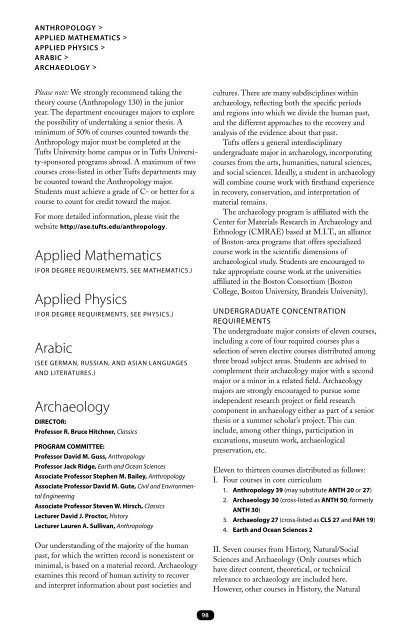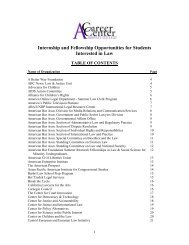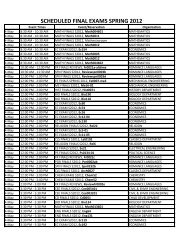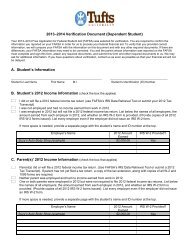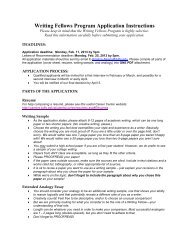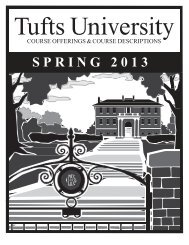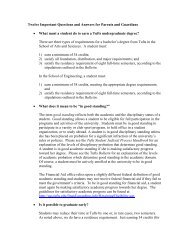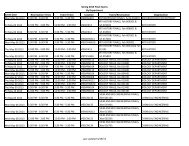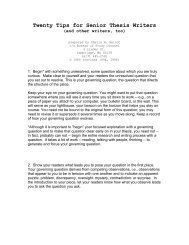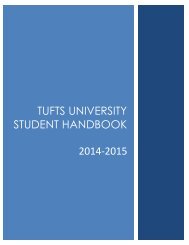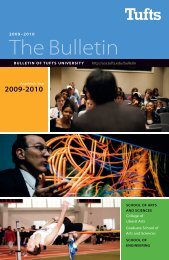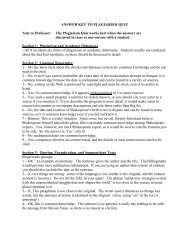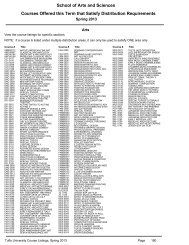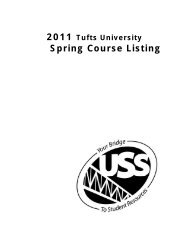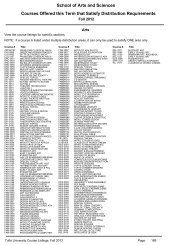2013â2014 The Bulletin - USS at Tufts - Tufts University
2013â2014 The Bulletin - USS at Tufts - Tufts University
2013â2014 The Bulletin - USS at Tufts - Tufts University
Create successful ePaper yourself
Turn your PDF publications into a flip-book with our unique Google optimized e-Paper software.
Anthropology ><br />
Applied mAthem<strong>at</strong>ics ><br />
Applied Physics ><br />
Arabic ><br />
Archaeology ><br />
Please note: We strongly recommend taking the<br />
theory course (Anthropology 130) in the junior<br />
year. <strong>The</strong> department encourages majors to explore<br />
the possibility of undertaking a senior thesis. A<br />
minimum of 50% of courses counted towards the<br />
Anthropology major must be completed <strong>at</strong> the<br />
<strong>Tufts</strong> <strong>University</strong> home campus or in <strong>Tufts</strong> <strong>University</strong>-sponsored<br />
programs abroad. A maximum of two<br />
courses cross-listed in other <strong>Tufts</strong> departments may<br />
be counted toward the Anthropology major.<br />
Students must achieve a grade of C- or better for a<br />
course to count for credit toward the major.<br />
For more detailed inform<strong>at</strong>ion, please visit the<br />
website http://ase.tufts.edu/anthropology.<br />
Applied M<strong>at</strong>hem<strong>at</strong>ics<br />
(FOR DEGREE REQUIREMENTS, SEE M<strong>at</strong>heMAtics.)<br />
Applied Physics<br />
(FOR DEGREE REQUIREMENTS, SEE PHYSICS.)<br />
Arabic<br />
(SEE GERMAN, R<strong>USS</strong>IAN, AND ASIAN LANGUAGES<br />
AND LITERATURES.)<br />
Archaeology<br />
DIRECTOR:<br />
Professor R. Bruce Hitchner, Classics<br />
PROGRAM COMMITTEE:<br />
Professor David M. Guss, Anthropology<br />
Professor Jack Ridge, Earth and Ocean Sciences<br />
Associ<strong>at</strong>e Professor Stephen M. Bailey, Anthropology<br />
Associ<strong>at</strong>e Professor David M. Gute, Civil and Environmental<br />
Engineering<br />
Associ<strong>at</strong>e Professor Steven W. Hirsch, Classics<br />
Lecturer David J. Proctor, History<br />
Lecturer Lauren A. Sullivan, Anthropology<br />
Our understanding of the majority of the human<br />
past, for which the written record is nonexistent or<br />
minimal, is based on a m<strong>at</strong>erial record. Archaeology<br />
examines this record of human activity to recover<br />
and interpret inform<strong>at</strong>ion about past societies and<br />
cultures. <strong>The</strong>re are many subdisciplines within<br />
archaeology, reflecting both the specific periods<br />
and regions into which we divide the human past,<br />
and the different approaches to the recovery and<br />
analysis of the evidence about th<strong>at</strong> past.<br />
<strong>Tufts</strong> offers a general interdisciplinary<br />
undergradu<strong>at</strong>e major in archaeology, incorpor<strong>at</strong>ing<br />
courses from the arts, humanities, n<strong>at</strong>ural sciences,<br />
and social sciences. Ideally, a student in archaeology<br />
will combine course work with firsthand experience<br />
in recovery, conserv<strong>at</strong>ion, and interpret<strong>at</strong>ion of<br />
m<strong>at</strong>erial remains.<br />
<strong>The</strong> archaeology program is affili<strong>at</strong>ed with the<br />
Center for M<strong>at</strong>erials Research in Archaeology and<br />
Ethnology (CMRAE) based <strong>at</strong> M.I.T., an alliance<br />
of Boston-area programs th<strong>at</strong> offers specialized<br />
course work in the scientific dimensions of<br />
archaeological study. Students are encouraged to<br />
take appropri<strong>at</strong>e course work <strong>at</strong> the universities<br />
affili<strong>at</strong>ed in the Boston Consortium (Boston<br />
College, Boston <strong>University</strong>, Brandeis <strong>University</strong>).<br />
UNDERGRADUATE concentrATION<br />
REQUIREMENTS<br />
<strong>The</strong> undergradu<strong>at</strong>e major consists of eleven courses,<br />
including a core of four required courses plus a<br />
selection of seven elective courses distributed among<br />
three broad subject areas. Students are advised to<br />
complement their archaeology major with a second<br />
major or a minor in a rel<strong>at</strong>ed field. Archaeology<br />
majors are strongly encouraged to pursue some<br />
independent research project or field research<br />
component in archaeology either as part of a senior<br />
thesis or a summer scholar’s project. This can<br />
include, among other things, particip<strong>at</strong>ion in<br />
excav<strong>at</strong>ions, museum work, archaeological<br />
preserv<strong>at</strong>ion, etc.<br />
Eleven to thirteen courses distributed as follows:<br />
I. Four courses in core curriculum<br />
1. Anthropology 39 (may substitute ANTH 20 or 27)<br />
2. Archaeology 30 (cross-listed as ANTH 50; formerly<br />
ANTH 30)<br />
3. Archaeology 27 (cross-listed as CLS 27 and FAH 19)<br />
4. Earth and Ocean Sciences 2<br />
II. Seven courses from History, N<strong>at</strong>ural/Social<br />
Sciences and Archaeology (Only courses which<br />
have direct content, theoretical, or technical<br />
relevance to archaeology are included here.<br />
However, other courses in History, the N<strong>at</strong>ural<br />
98


